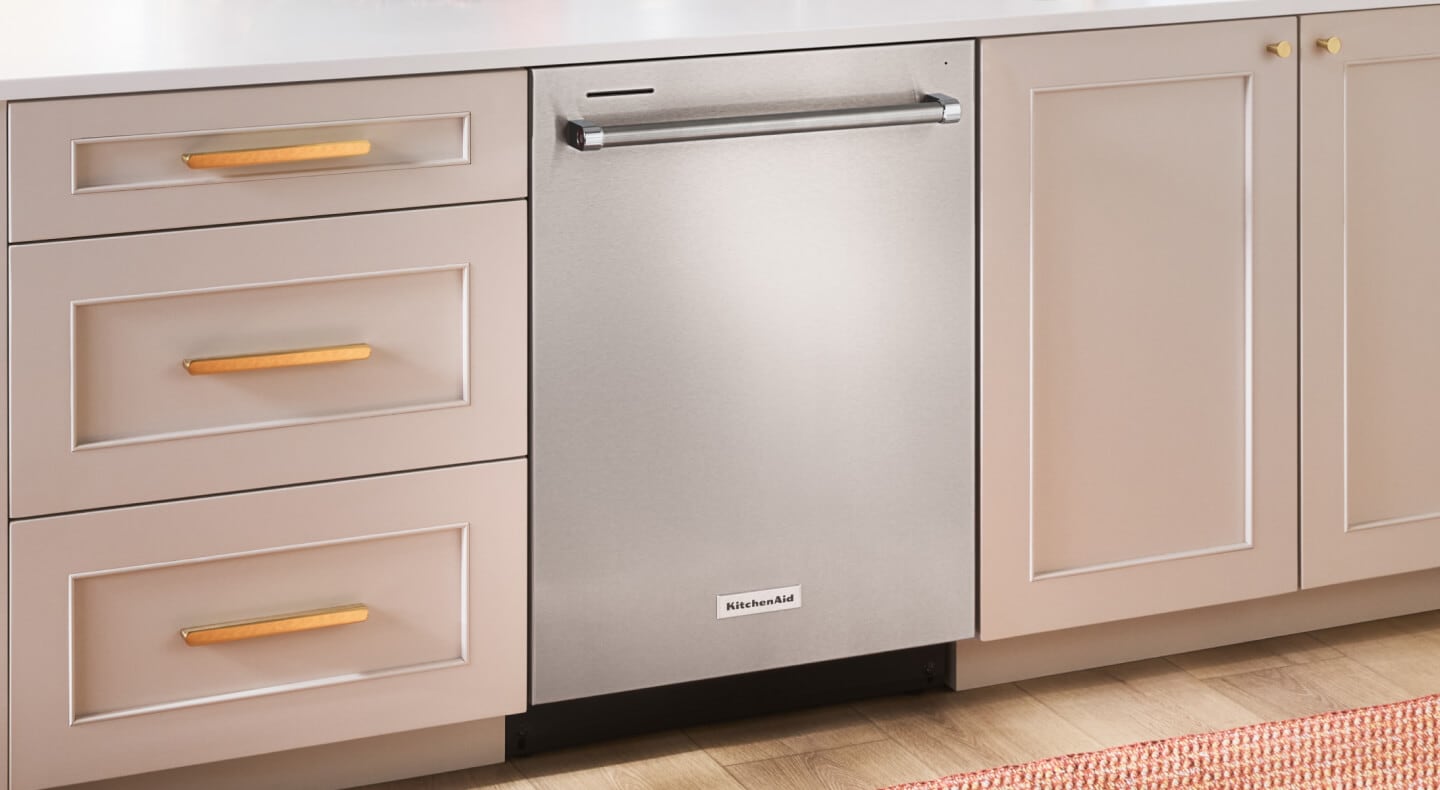
How to clean and deodorize a dishwasher
Your dishwasher may be one of the hardest working appliances in your kitchen. After all, it takes care of cleaning dishes, glasses, silverware, pots, pans and other essentials after the meal is done. But food residue and mineral buildup can keep your dishwasher from performing at its best. Keeping your dishwasher clean can help avoid clogs, leaks and damage. That’s why cleaning your dishwasher is an important part of appliance maintenance, with cleaning recommended every 30 days. Read this guide to learn more about how to keep your dishwasher clean and help it run smoothly.
Dishwasher cleaning instructions
Begin your clean by removing any food residue from the dishwasher interior. Then, wipe away grime from the inside of the door, its edges and the control panel before removing and cleaning your dishwasher filter. Finish off by wiping down the exterior door panel, sides and handle.
Follow the steps below for a more detailed walkthrough.
Supplies
Microfiber cloth or sponge
Soft toothbrush
Warm, soapy water
Dishwasher cleaning tablets (if applicable)
Stainless steel appliance cleaner (if applicable)
1. Remove food residue
To help keep your dishwasher smelling fresh for longer, remove food that drops into the dishwasher during loading and use a rag or paper towel to remove food caught in the drain after each cycle.
2. Wipe off grime
Grime like mineral deposits, limescale and sometimes grease can build up in the dishwasher over time, affecting your dishwasher's performance and leaving you with glassware that looks cloudy and dishes with caked-on crumbs. Using a damp microfiber cloth or sponge, wipe away residue from the inside of the door, including the door’s edges and control panel.
Your dishwasher’s gasket—the rubber seal that lines the door—needs some attention, too. Gently clean the gasket with a soft toothbrush to help remove grime from tough-to-reach crevices without putting too much pressure on the seal.
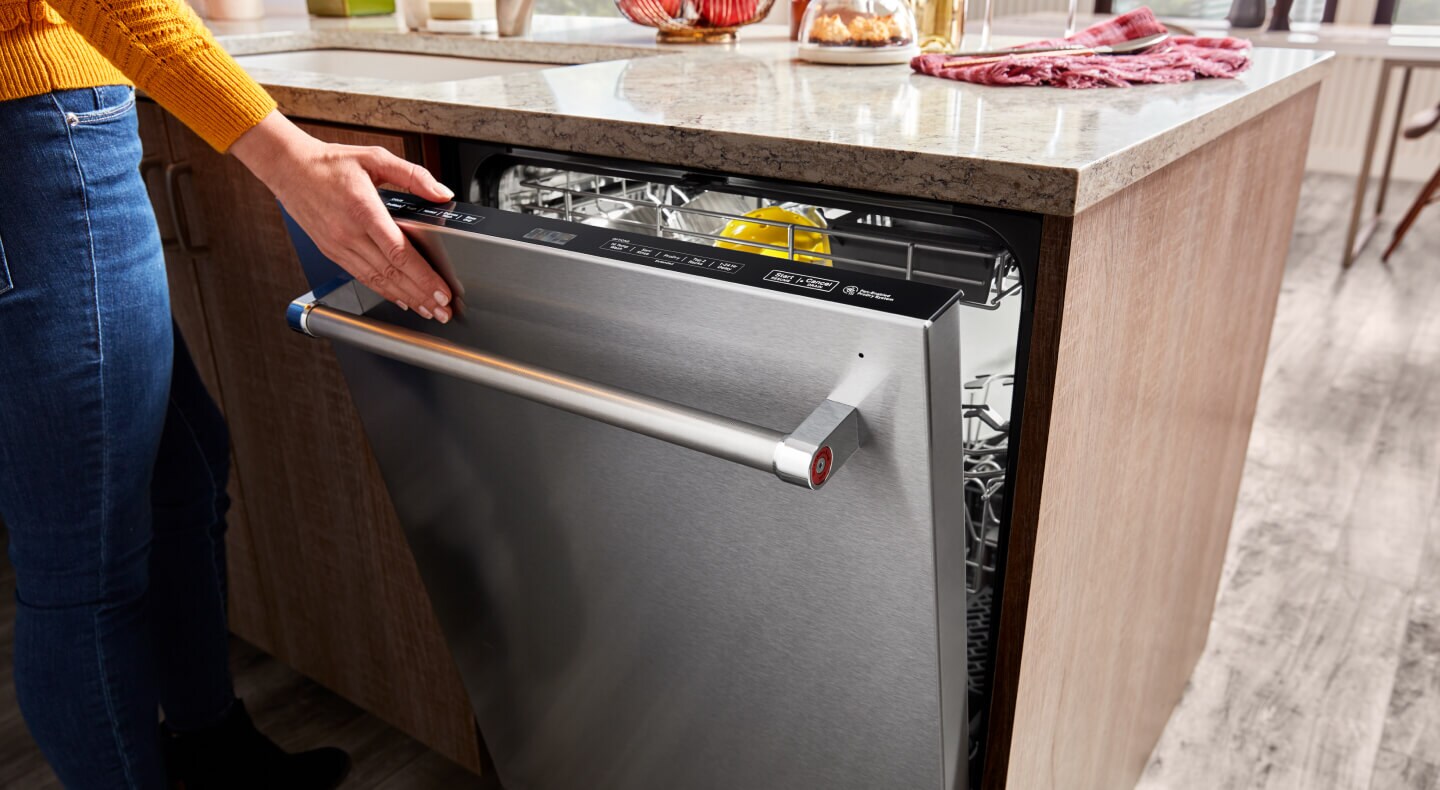
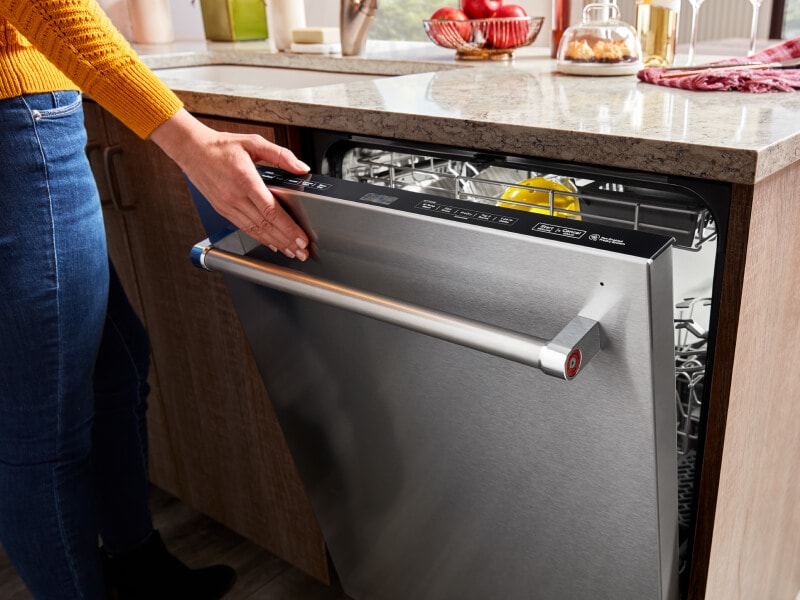
3. Remove and clean dishwasher filter
Unless your dishwasher has a maintenance-free filter, you’ll need to manually clean the filter about once a month to help keep it functioning well. Clean the filter by following the steps below:
Locate the filter below the spray arm on the bottom of the dishwasher, then unlock and remove it.
Wash the filter with warm, soapy water and use a soft toothbrush to get rid of any stuck-on food particles on the mesh and plastic components.
- Rinse the filter and lock it back into place.
Select KitchenAid® dishwashers feature True Self-Cleaning Filtration, the only dishwasher filtration system available that eliminates the need for manual filter cleaning. It continuously captures food particles, so only clean water circulates through the wash jets, then cleans itself as the dishwasher drains, so you can load without pre-rinsing.
1. Across brands owned by Whirlpool Corporation, including Maytag and Whirlpool
4. Use dishwasher cleaning tablets
Cleaning your dishwasher with cleaning tablets can be a great way to help remove buildup inside the dishwasher cavity, especially in hard-to-reach areas. Tablets can be a convenient cleaning solution, since most can be used in the dishwasher with or without loaded dishes, and many are safe to use with both stainless steel and plastic-tub dishwashers.
Always check your dishwasher’s manual and cleaning tablet user instructions before cleaning your dishwasher with tablets.
5. Wipe down outside of dishwasher
Help keep your dishwasher looking clean and sleek with regular wipedowns of the exterior door panel, sides and handle. A soft, damp cloth and mild detergent should do the trick, but stainless steel exteriors may benefit from specially formulated stainless steel cleaners. Remember to wipe back and forth in the direction of the grain when cleaning stainless steel appliances. Avoid using abrasive cleaning products on the exterior of the dishwasher, since they can damage the finish.
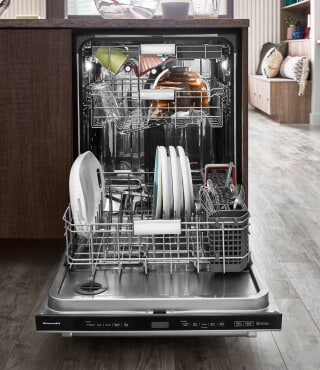
Need help finding your new dishwasher?
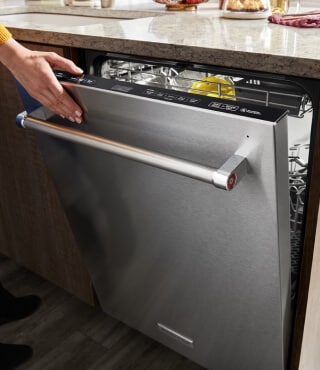
Compare top vs. front control dishwashers
Shop KitchenAid® dishwashers with Advanced ProDry™ System
Select KitchenAid® dishwashers come equipped with the Advanced ProDry™ System, which gets dishes table-ready by combining heating elements, fans and natural ventilation at the end of the cycle for KitchenAid brand's driest dry.1 Some KitchenAid® dishwashers are designed for quiet cleaning at 44 dBA. Shop KitchenAid® dishwashers designed for next-level cleaning performance.
1. Compared to KDTE804KPS Normal cycle with ProDry
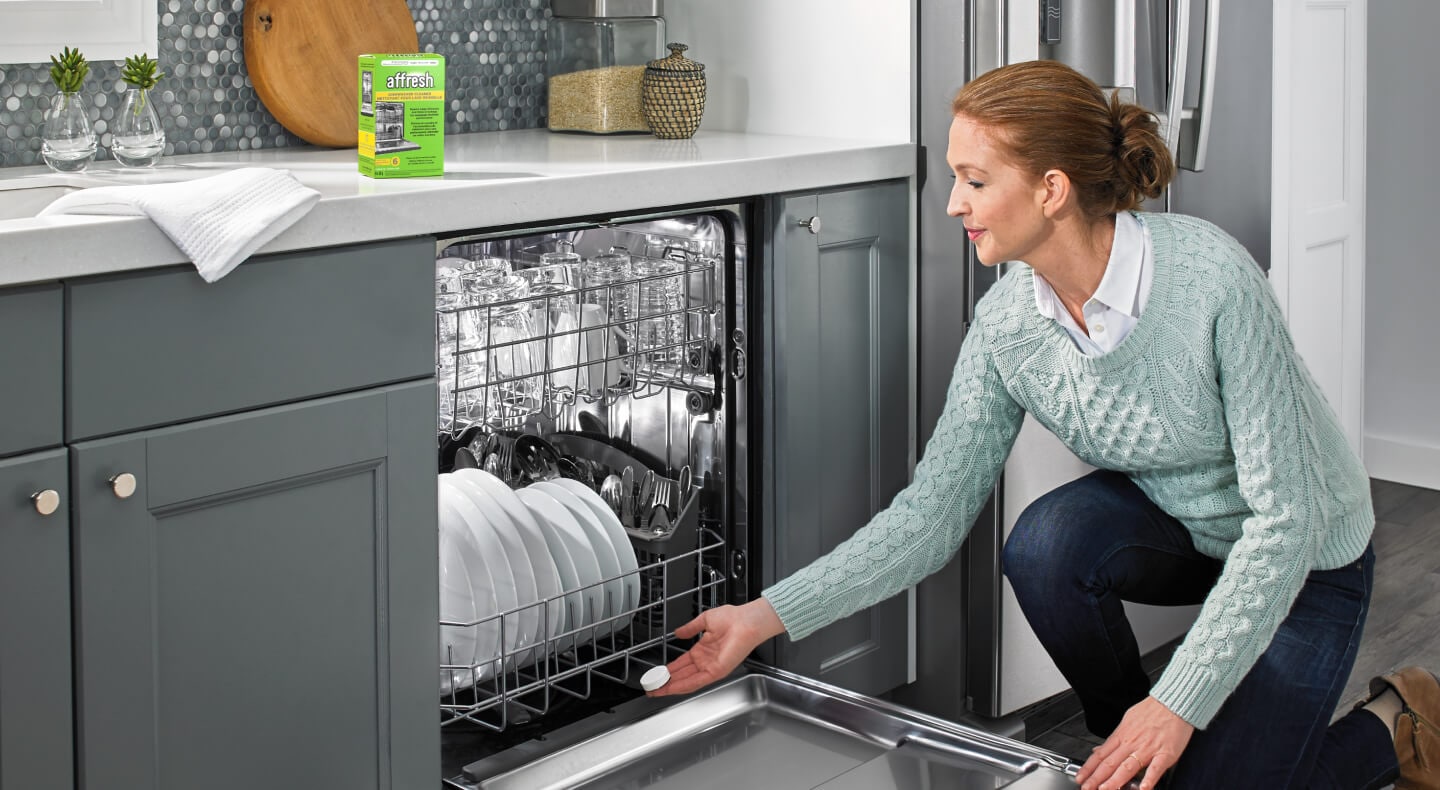
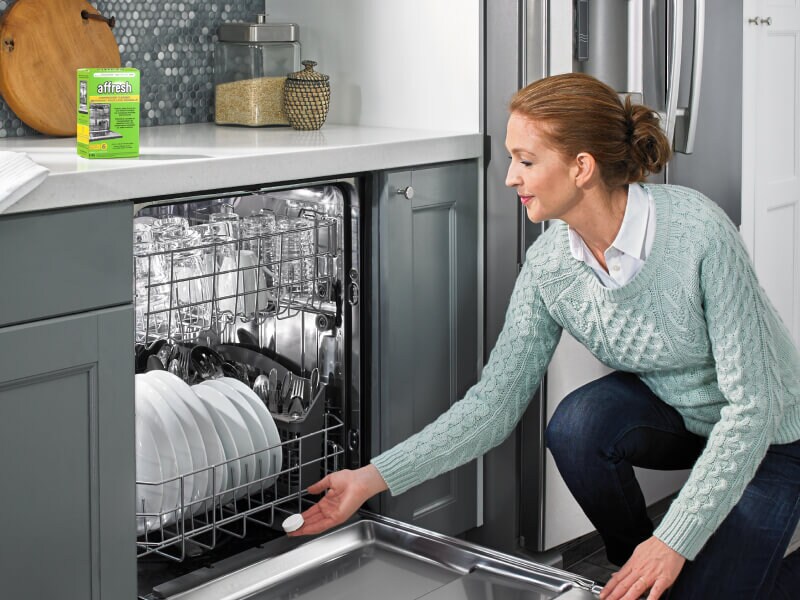
How to use affresh® dishwasher cleaner
Affresh® dishwasher cleaner is specially formulated to clean your appliance, and help clear away mineral buildup. Use affresh®dishwasher cleaner every month to help remove white spots and film from detergents. Depending on the severity of the spots, more than one treatment may be required.
Follow the instructions on the affresh® dishwasher cleaner package:
Cleaning your dishwasher without dishes:
- Place 1 tablet in the detergent tray.
- If there is significant mineral buildup, place a second tablet in the bottom of the dishwasher.
- Run a normal wash cycle.
Cleaning your dishwasher with dishes:
- Place 1 tablet in the bottom of the dishwasher.
- Place liquid or powder detergent or a dishwasher pod in the detergent tray.
- Run a normal wash cycle.
Find out where to buy affresh® appliance care products online and in-store.
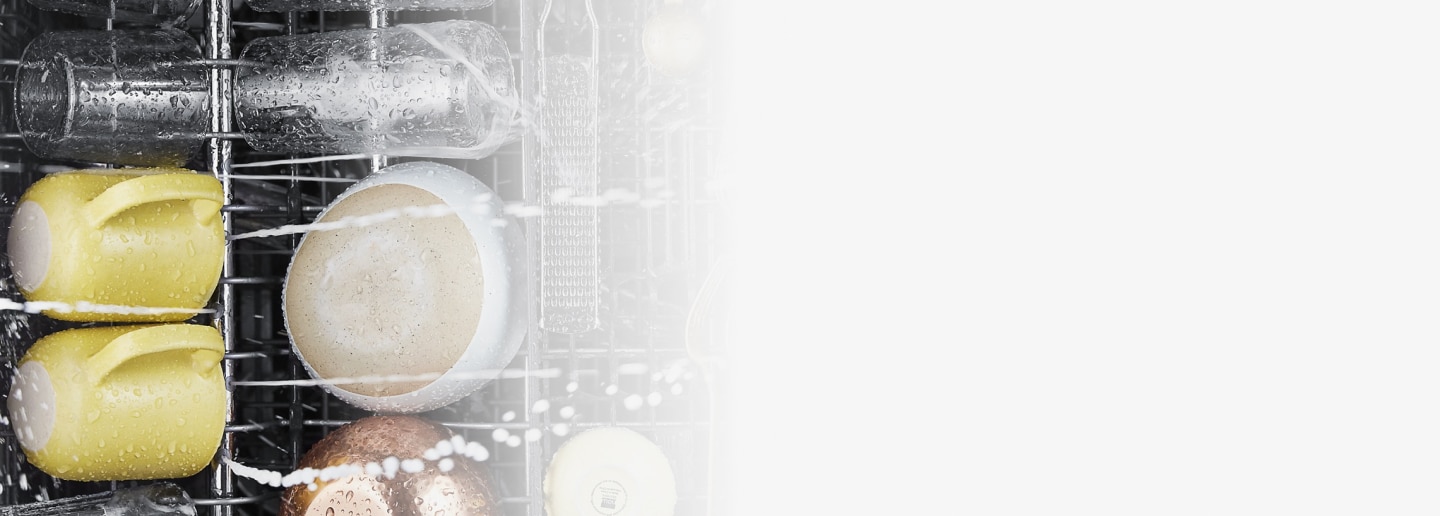
360° MAX JETS™ THIRD RACK
Fall in love at first wash
With this KitchenAid® dishwasher, you can load big messes without pre-rinsing thanks to 50 targeted wash jets plus 360° wash action on the third rack
How to clean a dishwasher with vinegar or baking soda
Cleaning a dishwasher with vinegar or baking soda can be a convenient alternative. When looking for the best way to clean a dishwasher, keep in mind that not every dishwasher interior should be cleaned with vinegar, so be sure to review your dishwasher’s Use and Care guide before following the steps below to clean with either of the household ingredients.
How to clean a dishwasher with vinegar
Vinegar can help break down any remaining food residue, detergent buildup and other grime. To clean your dishwasher with vinegar:
Fill a dishwasher-safe glass with 2 cups of white vinegar and place it on the bottom of the dishwasher. Do not use detergent—the vinegar will mix with the wash water
Run the dishwasher through a complete regular washing cycle using an air-dry or an energy-saving dry option.
After the cycle, if any stubborn spots or grime remain, wipe away with a soft, damp cloth.
NOTE: Vinegar is an acid, and using it too often could damage your dishwasher. Do so only when you need to deeply cleanse your dishwasher, and be sure to check your owners manual first for cleaning recommendations.
How to clean a dishwasher with baking soda
Using baking soda can help eliminate stains and help remove any lingering odors in your dishwasher. To clean your dishwasher with baking soda:
Sprinkle one cup of baking soda along the bottom of the dishwasher.
Run the dishwasher on a short, hot water cycle.
Let the dishwasher air dry.
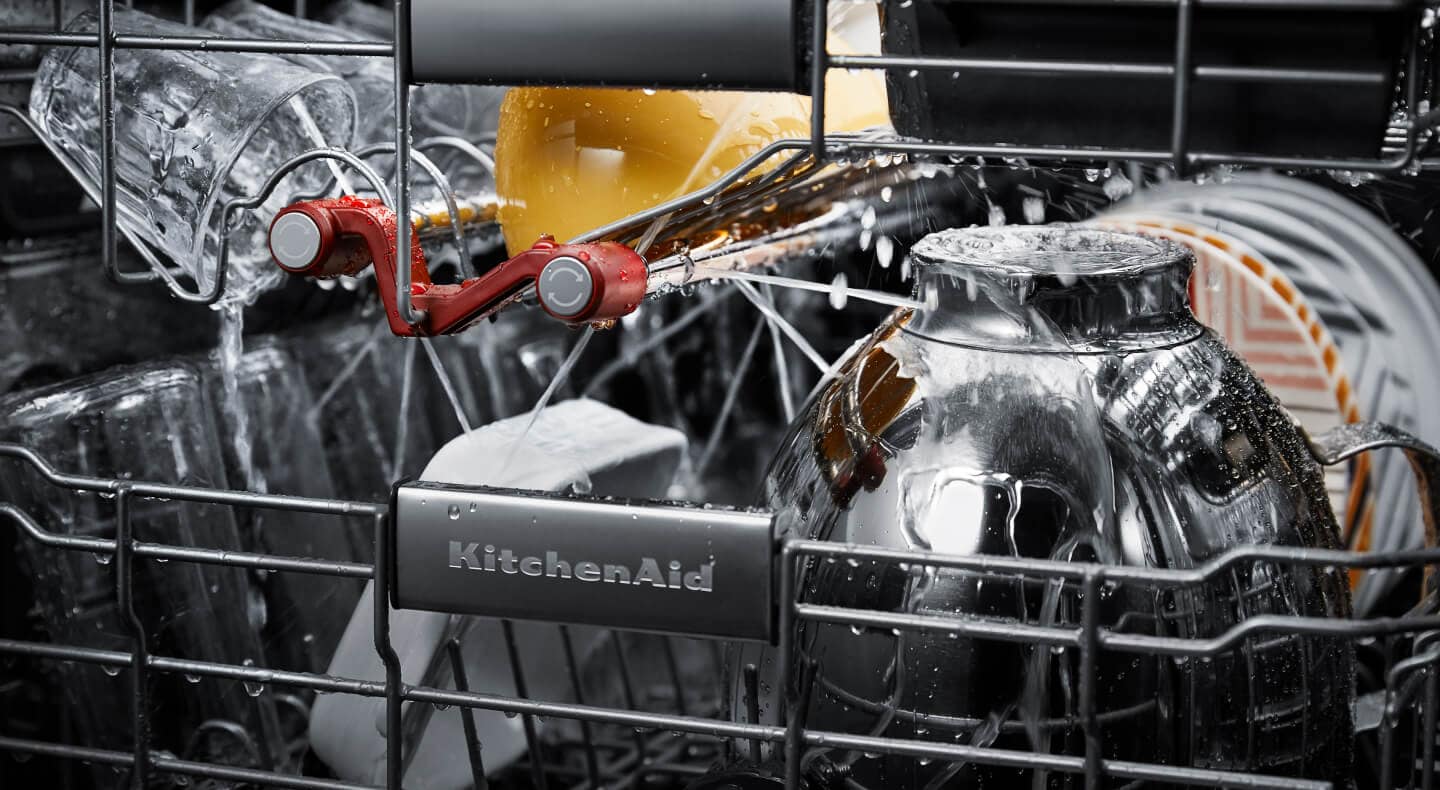
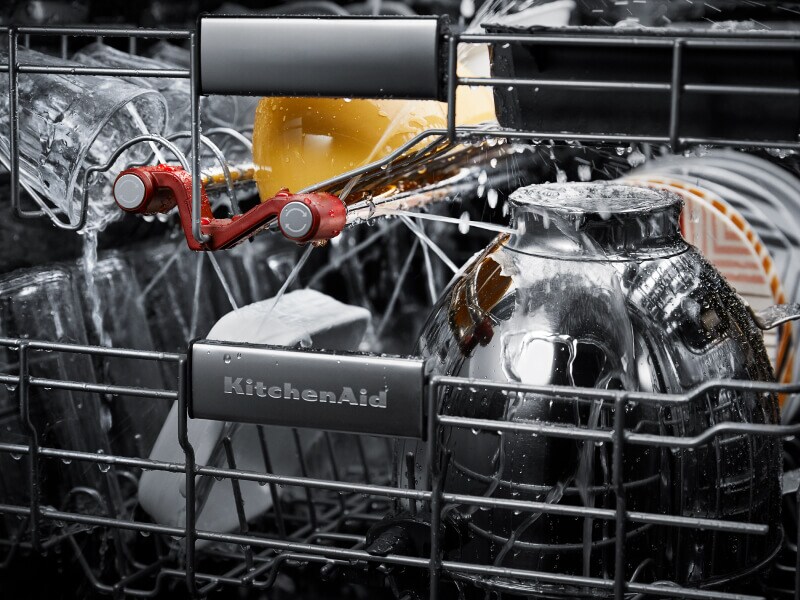
What is the best dishwasher cleaner for hard water?
If your house has hard water or water with a high mineral content, you’re more likely to run into significant mineral buildup inside the dishwasher and on your dishes. Try using a liquid rinse aid and keep the rinse aid dispenser filled at all times to help keep mineral buildup at bay.
Cleaning your dishwasher with a dishwasher cleaner should be part of your regular maintenance routine. However, some issues may require you to undertake a deeper cleaning routine. Extremely hard water mineral deposits can cause damage to your dishwasher and make it difficult to achieve a good cleaning, so a water softener is strongly recommended if your water hardness is 15 grains or more.
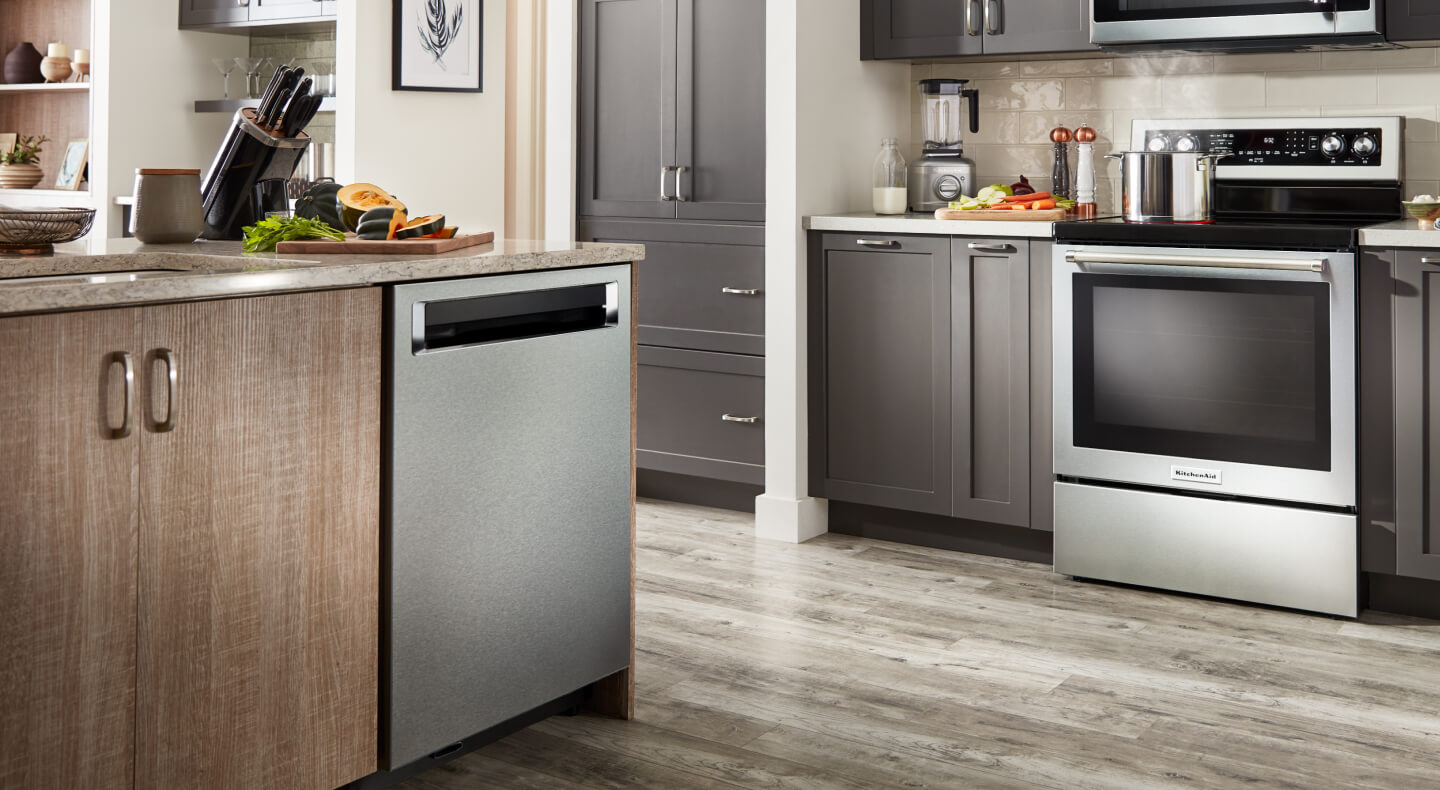
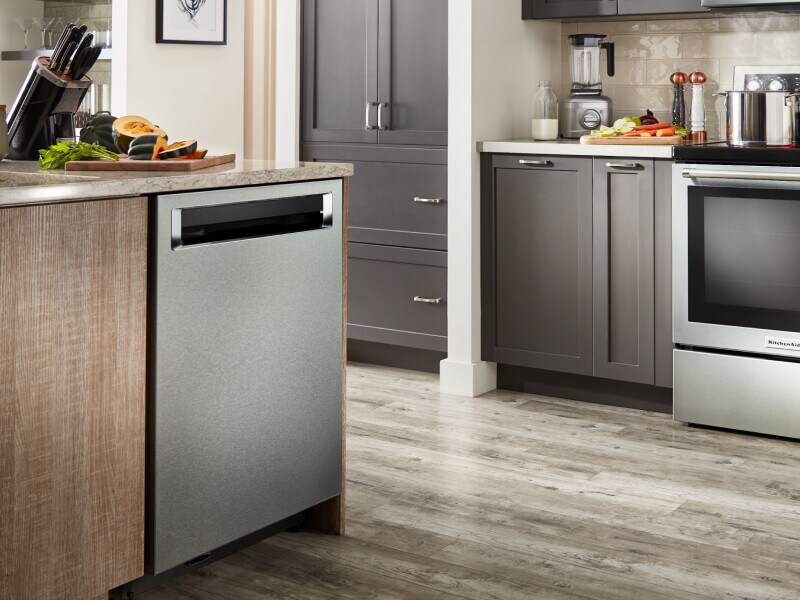
How to get rid of dishwasher odors
Unwanted dishwasher smells can range from the plastic smell of a new appliance to musty and spoiled smells that come from standing water or rancid food. If you only run your dishwasher every two or three days, try running a “rinse only” cycle each day until you have a full load to help keep odors under control.
Odors like petroleum, varnish or plastic often accompany a new dishwasher, and should dissipate within a few weeks. To help accelerate the process, try running a white vinegar rinse or using affresh® dishwasher cleaner to help reduce odors faster.
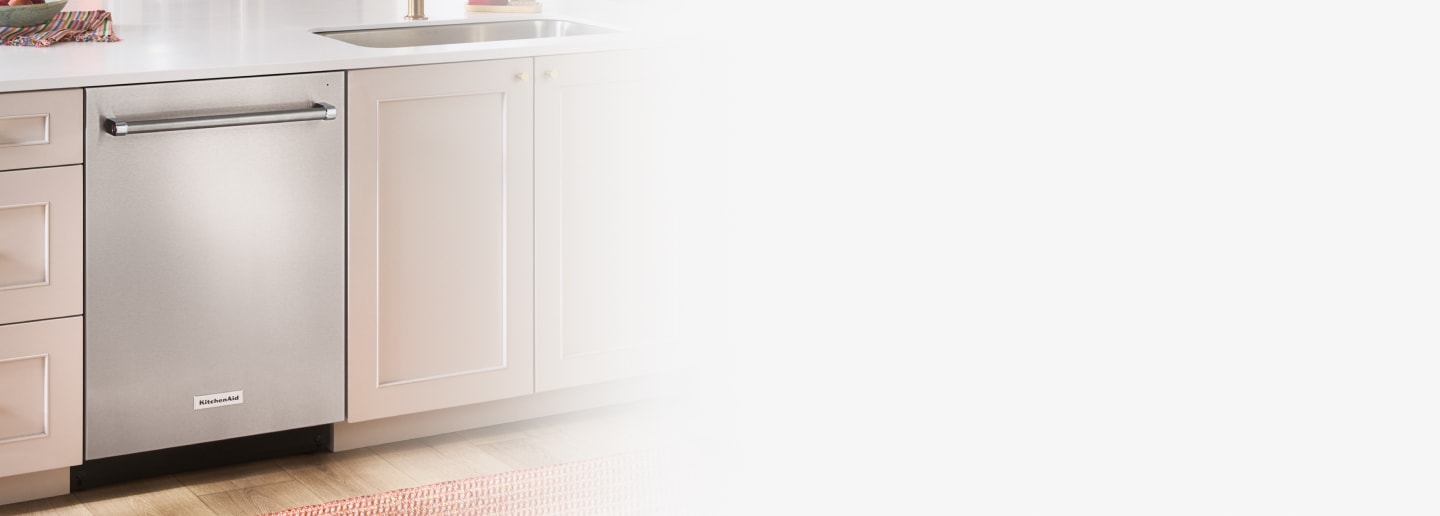
KITCHENAID® DISHWASHERS
Create more, clean up less
KitchenAid® dishwashers make kitchen cleanup easy, so you can focus less on cleaning and more on making

KitchenAid® Hardware Accessory Kits
Curate the colors and textures that move you
From bold Black Ore to the inviting warmth of Bronze, mix and match handles and knobs to refresh your appliances and bring new energy to your kitchen
